WJI and ACLU ask City Attorney Tearman Spencer to end Milwaukee city cannabis prosecutions5/13/2020
0 Comments
 Ashley Ashley By Gretchen Schuldt A successful Milwaukee program to provide defense lawyers to indigent defendants in Municipal Court is over because the city ended funding for it. Legal Action of Wisconsin, in the one-year, part-time pilot program, won or negotiated dismissal of 40% of citations issued in cases it defended, according to a report prepared by the agency. "The system works better if all parties are represented," said Kori Ashley, a Legal Action lawyer who worked on the project. Now that the program has ended, she said, "we're back to the same old, same old." The city pays police to issue tickets and the city attorney's office to prosecute cases. Indigent defendants in Municipal Court, though, are not entitled to court-provided lawyers, meaning that most indigent defendants who show up represent themselves, often not very well. Municipal Court is a money-maker for the city. In 2018, the court cost $3 million but brought in $5 million, according to city budget figures. The Common Council in November 2016 approved a budget amendment by Ald. Michael Murphy that allocated $45,000 to the defense lawyer project. Due to city delays in getting the paperwork done, however, the project did not launch until last year. Funding ran out at the end of 2019. Legal Action has applied for Community Development Block Grant funding to continue the program, and the council will vote on that in late spring or early summer. Murphy said he is "fully supportive" of the Municipal Court project. If it is not funded this year, he said, "I will certainly put it in the budget for next year." Some results, according to the Legal Action report:
Many clients don't have permanent addresses because of chronic homelessness. "These are individuals who absolutely need legal representation," Ashley said. Some clients had mental health issues with "very stark competency issues....These individuals should not be getting citations," Ashley said. Both the city attorney's office and Municipal Court judges were receptive to Legal Action's work, she said. Sometimes, mental health issues result in a client receiving multiple citations for offenses such as loitering or disorderly conduct, Ashley said. The agency cited in its report an example – a woman with severe mental health issues "routinely cited for retail theft from various stores for behavior that simply is out of her control." Legal Action represented her in four cases that that were dismissed because those issues, saving the woman $1,500 in court charges. In another case not related to mental health, a woman's identity was stolen by a relative, who then received several traffic tickets under the victim's name. "LAW successfully obtained the dismissal of the citations and significantly, the client's driving privileges were not suspended," Legal Action said in the report. In yet another instance, a woman for whom English is a second language was accused of shoplifting "and was unable to explain a simple misunderstanding due to the language barrier," LAW said. "This client's story was particularly impactful, because she is an elderly woman who came to this country 25 years ago and had previously no contact with law enforcement. She endured a tremendous amount of stress and felt an immense amount of shame because of the ticket." By Gretchen Schuldt
While Milwaukee city politicians last week asked Gov. Evers for help in addressing reckless driving, the city's own Police Department is writing far fewer traffic tickets than it did last year, Municipal Court figures indicate. The number of traffic cases filed in the court fell by 46%, or 26,462 cases, this year through September, a reflection of decreased enforcement. While not every traffic ticket becomes a Municipal Court case – some may be dismissed before they get to court, for example – court filings are a good proxy for police activity. There were 30,940 traffic cases during the first nine months of the year compared to 57,402 through September of last year, according to Municipal Court statistics. This year’s numbers also trail the 31,515 filed total through September 2017. Ticket-writing jumped in 2018 amid public outrage about reckless driving. The anger has not abated, but the ticket writing has.  By Gretchen Schuldt Getting a ticket instead of being charged with a crime might seem like a lucky break, but that ticket can get you added to a criminal database and ultimately hurt future job and housing opportunities, according to Kori Ashley, staff attorney with Legal Action of Wisconsin. If that ticket is accompanied by arrest and fingerprinting the information can go – and sometimes must go – to the State Department of Justice and become part of a Crime Information Bureau criminal background report provided to anyone who asks for it and pays $7, Ashley said. "I would say to never ignore the ticket," said Ashley, who represents indigent defendants in Milwaukee Municipal Court. "I would treat this ticket just like I would treat a criminal summons I received in the mail because ultimately, if you have been fingerprinted, it will show up on your background report, just like a criminal arrest and charge." Tougher drunk driving laws proposed: mandatory minimums, criminalized first offenses, surcharges1/31/2019 By Gretchen Schuldt
State legislators have introduced a package of drunk-driving proposals that would increase minimum prison terms for people with five or six drunk driving convictions and criminalize first-offense drunk driving, which now is considered a civil ordinance violation. Another bill would impose financial penalties on some alleged first-time offenders that are not levied on those charged criminally with operating while intoxicated second offense or greater. Currently, those convicted of their fifth- or sixth-offense drunk driving offense face a minimum of six months' incarceration and a $600 fine. The bill would require a prison term of at least 18 months. By Gretchen Schuldt Seventy percent of the possession of marijuana cases filed in Milwaukee Municipal Court last year were against African Americans, records show. Blacks account for just 40% of the city's population, but were defendants in 601 of the 860 marijuana possession cases. In addition, 139 cases were filed against Hispanics, 30 more than the 109 cases filed against whites, according to Municipal Court statistics. Hispanics account for just 17 percent of the city's population; whites make up 45% of the city's residents. The Municipal Court caseload reflect activities of the Police Department. The Wisconsin Justice Initiative previously reported that African-Americans in Milwaukee County were far more likely to be charged with felony second offense possession of marijuana cases than are other races. Simple possession of less than 25 grams of marijuana in the city can usually be charged as a municipal offense rather than as a state misdemeanor or felony. The municipal fine for possession is $50, though costs and fees will increase that to $124 for an adult and $94 for a juvenile. (Smoking marijuana in a public place is punishable by a fine of up to $250 plus fees and costs.) Below is a map showing the Milwaukee or mostly Milwaukee zip codes where Municipal Court defendants charged with possession of marijuana resided and the number cases brought against those defendants.
Not all Municipal Court defendants live in Milwaukee and so not all cases are shown. 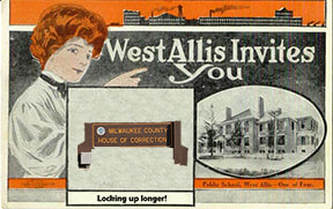 By Gretchen Schuldt West Allis municipal ordinance violators last year spent a total of 21.5 inmate years in the House of Correction because they did not pay their fines. That is more time than the 18.7 inmate years non-paying ordinance violators from all 18 other county municipalities served, according to preliminary House of Correction figures. Because municipal violations are considered civil offenses, rather than criminal, defendants are not entitled to legal counsel. Municipal violations are petty offenses such as disorderly conduct, littering, and traffic violations that are handled through tickets and municipal courts operated by cities and villages. West Allis' 2017 commitment total was up 3.1 years, from the 18.4 years ordinance violators in that city spent locked up in 2016, according to House data. In contrast, Bayside, Hales Corners, Shorewood, Whitefish Bay, and West Milwaukee did not send anyone to the House for non-payment of forfeitures in 2017, according to the figures. A total of 11 municipalities showed a drop in the number of days municipal offenders were locked up. St. Francis showed the biggest decline in days. It sent ordinance violators to the House for a total of 888 days in 2016 and 155 in 2017, a decline of 733 days, or two inmate years. Bayside, Fox Point, Glendale, Greendale, Greenfield, Oak Creek, River Hills, South Milwaukee, Wauwatosa, and Milwaukee also showed declines. Milwaukee's figures might be misleading because some Milwaukee's municipal commitments are served at the County Jail, not at the House, where the vast majority of suburban commitments are served. House commitment days increased in Brown Deer, Cudahy, and Franklin, in addition to West Allis, according to the preliminary figures. West Allis forfeitures for municipal violations are some of the highest in the county. A simple marijuana possession charge, for example, carried a $1,321 price tag. That also was the case in 2015, according to a Public Policy Forum report. Meanwhle, the same offense in Bayside typically carried, typically, a $691 financial hit; in Shorewood, the cost was $376; in Wauwatosa, $100 - $200. State law requires municipalities to reduce the amount of an unpaid Municipal Court fine by at least $50 for each day a violator is jailed, and most (but not all) municipalities hold to the $50 amount. So an unpaid Wauwatosa marijuana citation that would result in a four- to six-day stay in the House would mean in a 26-day stay if the ticket was issued in West Allis. By Gretchen Schuldt Municipal Court traffic cases were down 13 percent during the first nine months of the year compared to the same time period last year, court records show. Overall, there were 31,515 traffic cases in Milwaukee Municipal Court through September, down 4,912 from the number in the same time period last year, an average drop of 546 cases per month. The court does not originate the cases - the statistics reflect the activity of the Milwaukee Police Department. The number of traffic cases jumped sharply in August and September as public pressure about the issue got through to police. The Police Department is using a data-driven system, Data Driven Approaches to Crime and Traffic Safety (DDACT), to identify traffic enforcement target areas, Asst. Police Chief James Harpole said. DDACT effort was made a priority enforcement tool in April, he told the Common Council's Public Safety and Health Committee. Steve O'Connell of the Sherman Park Neighborhood Association listed for committee members some high-accident areas around Sherman Park. Sherman Park residents gathered signatures on petitions seeking a written plan from the Police Department on how it will step up traffic enforcement in the city. The petitions also ask that police be required to report to the committee monthly on how many traffic tickets they issue. The circulators collected 76 pages of signatures without too much effort, O'Connell said. The number of tickets issued by police has gone down dramatically over several years, he said. "What's going on? Why less tickets? There's no reason for less tickets," he said. Committee Chair Ald. Robert Donovan said bad driving was "epidemic" throughout the city. "I am telling you, and you know damned well...that traffic safety in this city is for crap," Donovan told Harpole. "Every single time I drive, I'm actually afraid," Ald Mark Borkowski said. He expressed some frustration with a police PowerPoint presentation on crime and traffic enforcement. "All I'm hearing is statistics," he said. "We all get these damned calls, and it's not right. These roads are out of control and it's not OK."
Harpole said traffic enforcement was a priority for the police. "Our officers are putting forth a concerted effort every single day to make this city a safer place," he said. A County Board committee recommended, 5-0, on Thursday that the county increase the daily amount it charges municipalities to house municipal ordinance violators in the House of Correction and the County Jail. The $25.40 per day the county now charges has not changed in 10 years. The new charge has not been determined, but could be in the $35 - $40 per day range, Deputy Corporation Counsel Colleen Foley told the Judiciary, Safety and General Services Committee. The Wisconsin Justice Initiative, during the 2017 budget process, asked county supervisors to consider raising the rate both to increase county revenue and discourage municipalities from using the incarceration option for petty offenders. State law allows the county to recover certain costs associated with housing the offenders, who are Municipal Court defendants who do not pay their forfeitures on time and who do not attend a hearing to determine whether they are qualified for an alternative sentence due to poverty. Foley made clear to the committee that the county is limited in the costs it may recover from the communities. Last year, municipal ordinance violators were locked up in the House of Correction for a total of 43.73 years, according to county figures. Because municipal ordinance violations are considered civil matters and not crimes, defendants are not entitled to attorneys. Photos, from left: County Supervisors Deanna Alexander, Theodore Lipscomb, and Sheldon Wasserman. Supervisor Sheldon Wasserman said the resolution is not designed as a money-maker, but to cover costs. Wasserman is sponsoring the measure with County Board Chairman Theodore Lipscomb and County Supervisor Deanna Alexander. West Allis will be the most affected by any rate increase, as it incarcerates far more municipal defendants than any other community in the county. Last year, West Allis incarcerated municipal ordinance violators for a total of 18.7 years. The chart below shows how many times a municipality committed a Municipal Court defendant to the House, how many total incarceration days the defendant served, and the average commitment length. Most commitments from Milwaukee Municipal Court, per Sheriff David Clarke's directive, are served at the County Jail in downtown Milwaukee, not at the House of Correction in Franklin, where commitments originating in the suburbs are served. The chart captures only those Milwaukee defendants transferred to the House, generally when the jail reached its population capacity. The number of commitments from each community does not necessarily reflect the number of individuals incarcerated, as a person can have more than one commitment. The table below was updated May 18, 2017 to reflect adjustments provided by the House of Correction. The City of Milwaukee also paid the Sheriff's Department for 72 boarding days for commitments served at the County Jail, according to the city comptroller's office.
There were a total of 2,483 commitment days served at the jail in 2016, according to the Milwaukee County Department of Administration. Generally, only City of Milwaukee commitments are served at the jail.  Hill Hill Incumbent Valarie Hill on Tuesday took first place in a four-way Municipal Court primary that saw just 7.9 percent of registered city voters cast ballots. She will face second-place finisher William Crowley, a disability rights lawyer, in the April 4 general election. Just 27,855 of the city's 352,765 registered voters cast ballots in the race, according to preliminary returns from the Milwaukee Election Commission. Hill, a Municipal Court judge since 2004, garnered 13,084 votes. That is 46.7 percent of ballots cast for any candidate in the race, including write-ins, but represents votes from just 3.7 percent of registered voters. Hill's perceived acerbic attitude toward those who appear before her and the failure by the court's three judges to fully inform defendants of their rights are issues in the race.  Crowley Crowley Crowley, a lawyer with Disability Rights Wisconsin, won 5,356 votes, 19.2 percent of those cast in the race. He won support from just 1.5 percent of registered city voters. Third-place finisher Brian J. Michel, a lawyer with the Legal Aid Society, received 4,880 votes,or 18% of the total. Just 1.4 percent of registered voters cast their ballots for him. The final candidate, Assistant City Attorney Kail Decker, got 4,342 votes, or 16 percent of the total in the race. Some 1.2 percent of city voters supported him. Write-in candidates got 193 votes, or 0.69 percent of the total cast in the race. |
Donate
Help WJI advocate for justice in Wisconsin
|
Copyright © 2024 Wisconsin Justice Initiative Inc.
The Wisconsin Justice Initiative Inc. does not endorse candidates for political office. The Wisconsin Justice Initiative Inc. is a 501(c)3 organization.
The Wisconsin Justice Initiative Inc. does not endorse candidates for political office. The Wisconsin Justice Initiative Inc. is a 501(c)3 organization.

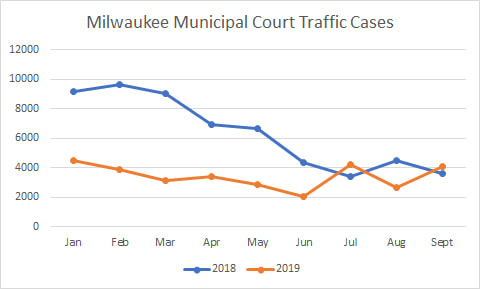
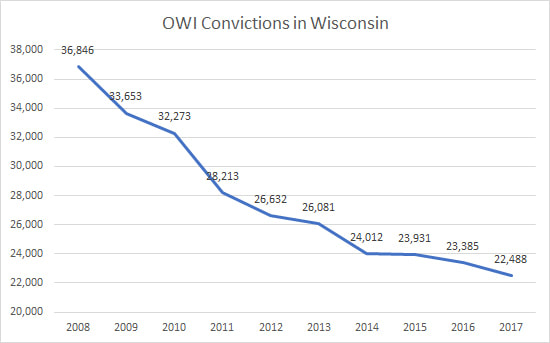
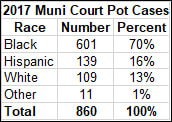
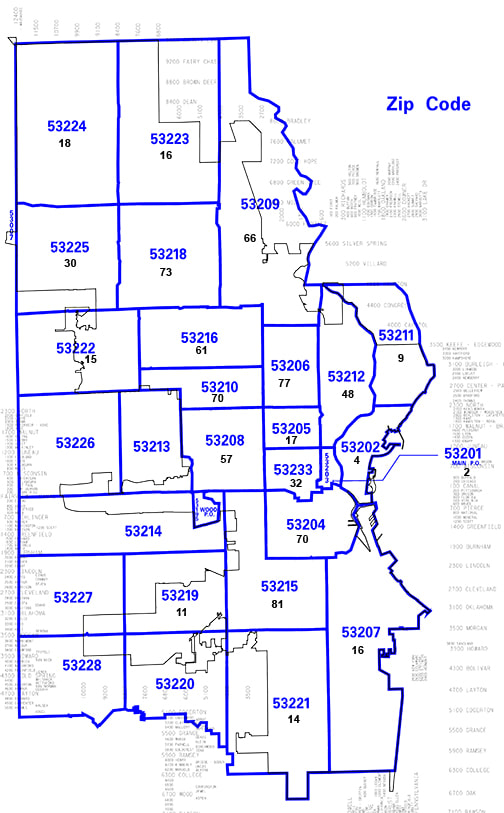
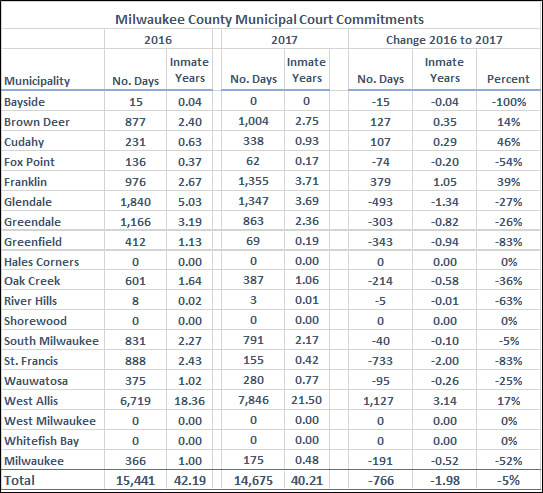
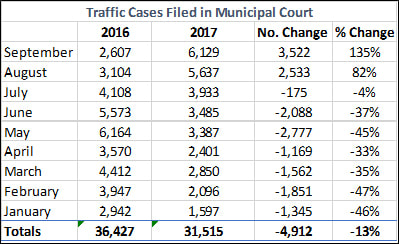
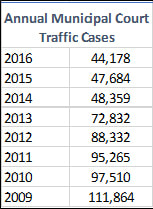



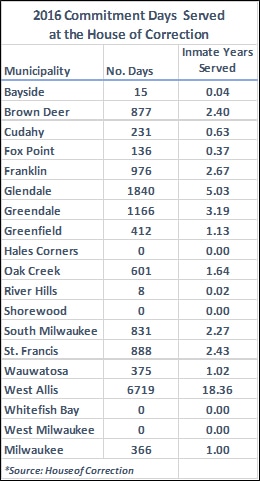
 RSS Feed
RSS Feed